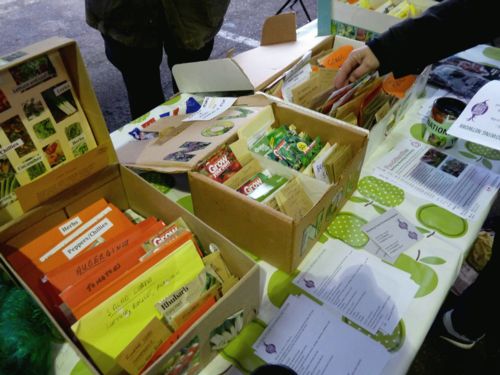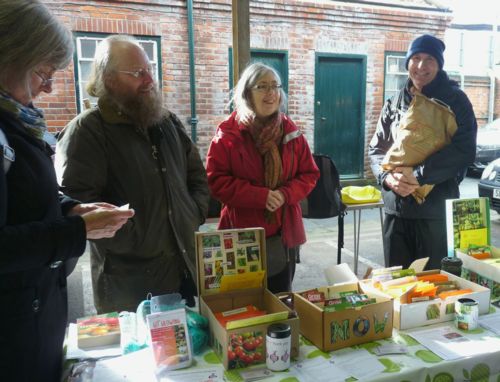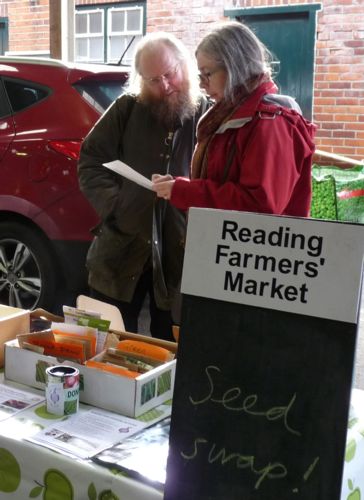Seed Swap
RFGN runs seed swaps at community events throughout the year. This normally includes Reading Farmers' Market, Bean Pole Day, WaterFest, East Reading Festival and Reading Town Meal. During Covid many of these events were cancelled so we ran an online seed swap. That proved successful, and we are continuing to offer the service.
We have some really interesting seeds in the swap boxes this year so we are running a postal delivery service for RFGN and Reading food growers.
We have a wide range of vegetable seeds available, plus herbs, and even some fruit and flowers. The current list can be found on our seed swap seeds page.
The easiest and quickest way for us to manage this at the moment is for you to email us with details of what you would like and your address, we'll then check availability and post them to you.
We do not charge for the seeds but donations are welcome, especially in the form of surplus seeds, or via Paypal:
Please contact us for an address if you want to post seeds to us.
Check our RFGN Events page for any upcoming swaps.
How it works
Prepare your seeds
If you've got any fruit, vegetable, herb or even flower seeds that you don't want, please bring them along. Here's everything you need to know:
Seeds still in the suppliers' packaging
Bring them along in the packet. It doesn't matter whether or not it's been opened. The team will repackage the seeds if necessary.
It's best if the packaged and sow by dates are still visible, but it doesn't matter if the seeds are beyond their sow by date. The team will still accept them and test them for viability or offer them in the "Pot Luck" box.
Seeds you have harvested yourself
Make sure that your harvested seeds are clean and dry. Some will need no or very little preparation e.g. poppy seeds. Others such as tomato seeds will have to be cleaned and dried.
You can donate the seeds in a large envelope, re-used plastic container or bag and the team will split them up into smaller envelopes. Alternatively you can divide them up into smaller packages. Dinner money envelopes are ideal for small seeds.
Contact us at seeds@readingfoodgrowingnetwork.org.uk if you require advice or help with suitable packaging materials.
Please write the following information on the envelope:
- The type of crop, eg tomato
- The variety if you know it, eg Oxheart, or a brief description, eg 'yellow beefsteak tomato'
- The month and year you harvested them
- If you have packaged your harvest in small envelopes, ready to go, then it is useful to put the approximate number of seeds in the packet. Do not worry about doing this for very small seeds such as poppies!
- Sowing instructions and sow by dates, if known – we can add these if you are not sure what they should be.
- Any additional information you think might be useful such as your experience of how successful the plants were under certain growing conditions.
Once the seeds are ready
Either wait for an event that RFGN is attending and deliver them in person (see below) or get in touch with the seed swap by email seeds@readingfoodgrowingnetwork.org.uk for advice on collection or delivery of the seeds.
On the day
Don't forget to bring your seeds with you and hand them over to the team running the seed swap.
Enjoy yourself rummaging through the seeds boxes to find seeds you want. We normally have three main boxes of seeds, plus a box of seeds to "Grow Now", and often a "Pot Luck" box of seeds that are past their sow-by date or are not well identified. Our seeds are a mixture of popular varieties from the main seeds suppliers, organic varieties from small seed companies and co-ops, and interesting self-harvested seeds from various Reading growers so there's likely to be something of interest to everyone.
If the seeds you are interested in are in a large packet, please take a smaller envelope and take the number you need, leaving the rest for someone else to enjoy. It might be a good idea to take a photo of the packet as a reminder of all the planting details.
If you didn't bring any seeds with you, or feel that you've taken more than you brought, please leave a donation. These are used for the seed swap, to buy more seeds and supplies to keep the seed swap running.
Run an event or group?
Reading Food Growing Network are happy to provide a "Hub" of seasonal food growing activities for events and groups. The first version is our Seed Swap: boxes of seeds, with help on how to run a seed swap.
If you are interested in having the seed swap at your event or meeting, please Contact Us.
Can you help?
Reading Food Growing Network are always looking for volunteers to help on the seed swap stand. This involves any or all of the following:
- Running the seed swap (instructions provided)
- Chatting to visitors
- Transport and set up / pack down
If you are interested in helping, please Contact Us.
Related resources
Grow Your Own Vegetables
Excellent book on growing vegetables with sections on techniques, a directory of vegetables, seasonal guide to jobs, and appendices on veg for the hungry gap, successional sowing and more.
How to create a New Vegetable Garden
Charles Dowding draws on his years of experience, to show how easy it is to start a new vegetable garden. Any plot -- whether a building site, overgrown with weeds or unwanted lawn -- can be turned into a beautiful and productive vegetable area. Charles's no-nonsense and straightforward advice is the perfect starting point for the beginner or experienced gardener. The book takes you step-by-step through: * Planning and early stages * Clearing the ground * Mulch - what, why, how? * Minimizing digging * Sowing and planting across the seasons * Growing in polytunnels and greenhouses It is filled with labour-saving ideas and the techniques that Charles uses to garden so successfully, and is illustrated throughout with photos and tales from Charles's first year in his new vegetable garden.
Organic Gardening The Natural No-Dig Way
A very helpful book about growing fruit and vegetables organically and without digging.
RFGN Guide to Growing Beetroot
The Reading Food Growing Network guide to growing beetroot.
RFGN Guide to Growing French Beans
The Reading Food Growing Network guide to growing French beans, both climbing and dwarf.
RFGN Guide to Growing Onions
The Reading Food Growing Network guide to growing onions.
RFGN Guide to Growing Radishes
The Reading Food Growing Network guide to growing radishes.
RFGN Guide to Growing Salad Leaves
The Reading Food Growing Network guide to growing salad leaves, including rocket.
RFGN Guide to Growing Squash
The Reading Food Growing Network guide to growing squash.
Seed sowing techniques
Advice from the Royal Horticultural Society about how to sow seeds
Seed Viability Chart
Temperate Climate Permaculture's chart of seed viability times for the most common seeds used in gardens and farms



